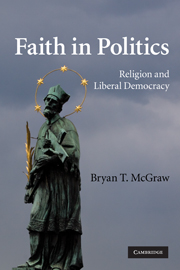Book contents
- Frontmatter
- Contents
- Acknowledgements
- Introduction
- 1 Europe's religious parties and the liberal consensus
- 2 The argument for deliberative restraint
- 3 The problem with secular reasons
- 4 Public reason and religious conflict
- 5 Religion and the problem of political autonomy
- 6 Making the most of conflict: religion and political toleration
- Conclusion: toward a better sort of liberal democracy
- Bibliography
- Index
2 - The argument for deliberative restraint
Published online by Cambridge University Press: 05 June 2012
- Frontmatter
- Contents
- Acknowledgements
- Introduction
- 1 Europe's religious parties and the liberal consensus
- 2 The argument for deliberative restraint
- 3 The problem with secular reasons
- 4 Public reason and religious conflict
- 5 Religion and the problem of political autonomy
- 6 Making the most of conflict: religion and political toleration
- Conclusion: toward a better sort of liberal democracy
- Bibliography
- Index
Summary
The liberal consensus regarding religion and democratic life has any number of components: views emphasizing the importance of separating church and state, concerns about religion's ambiguous relationship to the political virtue, a tendency to view religion as especially prone to fits of irrational passion, and so on. These overlapping concerns form the basis for the consensus's efforts to develop ways of constructing and maintaining political orders relatively free of public religious influence. Within the context of democratic politics, it has been religion's involvement in everyday political life, especially elections and public policy debates, that has made one concern in particular the subject of wide and vigorous debate. That concern centers on whether citizens may employ (or how they may employ) their religious views politically, whether they should propose and justify laws with rationales that depend on particular theological claims for their persuasiveness. Our arguments over any number of highly contentious public policy questions – abortion, euthanasia, cloning, and so on – run along two levels: we have arguments over the policy question in particular (e.g. should abortion be legal?); and we have arguments over how we ought to be arguing (e.g. what sorts of reasons should we bring to bear on those questions?). Digging into the arguments concerning any one of these sorts of questions almost always reveals a claim about how this or that sort of argument should be out of bounds precisely because it is religious (or maybe anti-religious) and that its employment violates in some central way the moral and civic obligations attendant on democracies.
- Type
- Chapter
- Information
- Faith in PoliticsReligion and Liberal Democracy, pp. 65 - 87Publisher: Cambridge University PressPrint publication year: 2010

